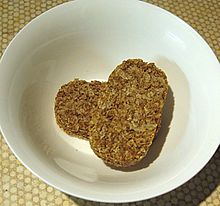
Exciting research from the UK suggests that to prevent celiac disease in children, the answer may be to feed the child gluten in early childhood (starting at 4 months of age). Early exposure!
Celiac disease, which occurs in about 1 in 100 people, is a lifelong condition caused by an abnormal reaction to gluten - a protein found in wheat, barley and rye. Eating gluten results in the body mounting an immune response that attacks and damages the small intestine, so that nutrients cannot be absorbed properly into the body. The only treatment for celiac disease is to strictly adhere to a gluten free diet.
The study included one group of children that had early exposure to high doses of gluten starting at 4 months (4 grams of wheat protein per week in the form of 2 Weetabix biscuits - wheat biscuits produced in the UK). They were compared to children who did not have gluten exposure until 6 months (standard dietary recommendations of breast milk only). At three years of age none of the early gluten group (0 out of 488 children) had celiac disease, while 1.4% (7 of 516 children) of the delayed gluten exposure had celiac disease.
This finding is along the lines of research suggesting that to prevent peanut allergies from developing feed small amounts of pureed peanut products (such as peanut butter or peanut puffs) to a child in the first year of life, starting as early as 4 months of age.
Another bit of interesting celiac disease research from 2019 found a link with higher fiber intake by the mother during pregnancy, especially of fruits and vegetables, and a lower incidence of celiac disease in the children. Also, gluten intake (high or low) by the pregnant woman had no effect on whether her child would later develop celiac disease.
From Science Daily: Early introduction of gluten may prevent celiac disease in children, study finds
Introducing high doses of gluten from four months of age into infants' diets could prevent them from developing celiac disease, a study has found.
...continue reading "Introducing Gluten At 4 Months Of Age May Prevent Celiac Disease In Children"

 Worried about the effects of persistent pesticides, flame retardants, and the chemicals used in non-stick pans (e.g.Teflon) on human health? An interesting
Worried about the effects of persistent pesticides, flame retardants, and the chemicals used in non-stick pans (e.g.Teflon) on human health? An interesting  Low gluten or gluten-free diets are a necessity for those suffering from Celiac disease or who are gluten intolerant. But low gluten diets are also followed by many people who do not have these diseases simply because they think it may be healthier for them. But is it healthier? Two recent studies raise health concerns about low gluten or gluten-free diets. Gluten is a protein found in wheat, rye and barley.
Low gluten or gluten-free diets are a necessity for those suffering from Celiac disease or who are gluten intolerant. But low gluten diets are also followed by many people who do not have these diseases simply because they think it may be healthier for them. But is it healthier? Two recent studies raise health concerns about low gluten or gluten-free diets. Gluten is a protein found in wheat, rye and barley. Finding out that so many of probiotics currently contain traces of
Finding out that so many of probiotics currently contain traces of